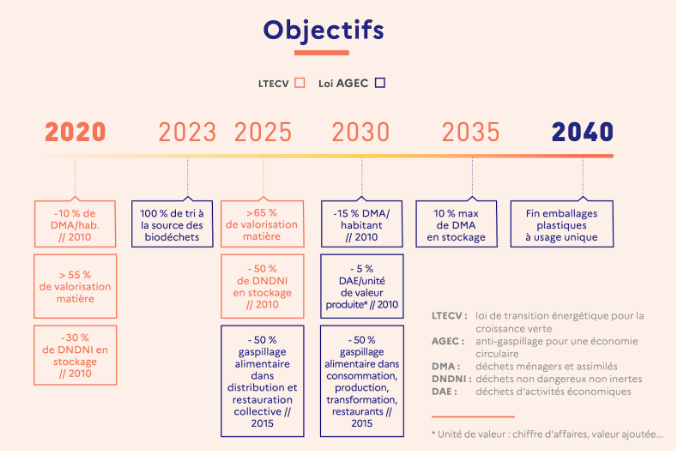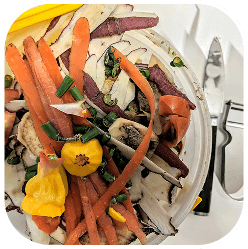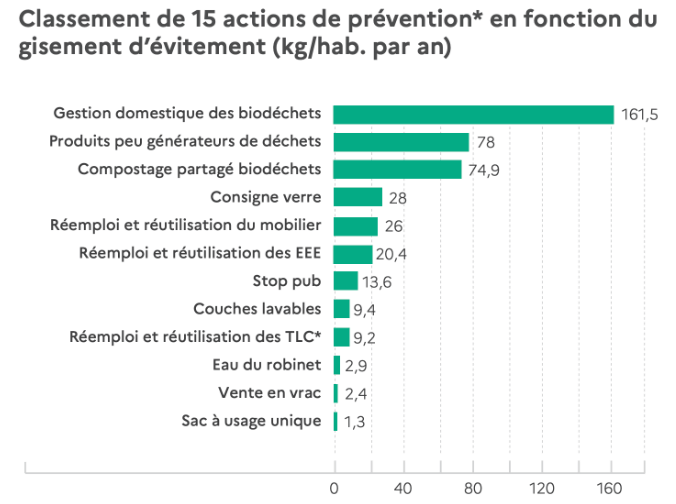According to an article published by ADEME (the French Agency for Ecological Transition) in February 2024, France generates more than 28.4 million tonnes of bio-waste per year. A significant proportion of this comes from households and businesses combined. In households, bio-waste accounts for around 30% of household waste.
Compliance with the AGEC law represents an operational challenge, but also an opportunity to optimise waste management costs, recover bio-waste and meet the growing expectations of consumers – and employees – for more responsible practices. For micro-businesses, SMEs, restaurants, local authorities and manufacturers, this involves, in particular, seeking suitable solutions such as those offered by Easy To Compost.

Biowaste is any organic waste of animal or plant origin that can decompose naturally. This includes food waste (leftovers, coffee grounds, peelings, etc.) and green waste (leaves, branches, grass clippings, etc.). Compostable packaging can also be considered biowaste, but it is crucial to remain vigilant. The ‘compostable’ label does not always guarantee a positive environmental impact: some packaging requires specific industrial facilities or breaks down into microplastics due to the thin layer of plastic needed to make the container waterproof.
It is a French law that came into effect on 10 September 2020. Its aim is to reduce waste and promote a circular economy. How? By encouraging reuse, recycling and waste recovery. The AGEC law also encourages people to consider each alternative in light of global constraints, all of which are equally important: climate change, biodiversity loss and ocean acidification. For example, very thin plastic packaging will have a lower carbon footprint than glass packaging (if not reused) but will have a greater impact on air pollution (if incinerated) or biodiversity (if discarded in the environment).
The main points of the AGEC law are:
Producers, distributors, restaurants and canteens are all affected. The aim of this law is to raise awareness among consumers and economic players about the importance of preventing food waste throughout the chain. This is why many solutions such as TooGoodToGo, Phénix and Nous Anti-Gaspi, as well as promotions at the front of shops, have become so widespread!
By requiring companies to improve consumer information on several issues related to waste and waste management. This includes the use of educational pictograms on packaging to clearly identify whether waste is recyclable or compostable. There are two main pictograms for composting: one indicating home composting (Home Compost) and one indicating the need for industrial composting (Ok Compost). The AGEC law has seen the emergence of innovative solutions such as the R-Coeur bottle, created by Citeo, which identifies bottles and other packaging designed to be reused.
For businesses, this translates into the emergence of innovative solutions that promote reuse and repair. For example, companies such as Vesto, Alpagga and Réseau Envie enable catering professionals to repair their equipment (fridges, ovens, etc.) rather than replacing it, thereby contributing to a circular economy.
It is this law that is gradually banning the use of certain single-use plastics, such as plastic cutlery and straws. This measure aims to combat plastic pollution and improve the carbon footprint of products and packaging.
Producers are now more responsible for the fate of their products after use. They must now think about eco-design, take-back and recycling.
Why is this law important? The AGEC law is part of a comprehensive approach aimed at preserving natural resources, combating climate change and creating a more sustainable economy. It represents a real turning point in waste management in France, with significant implications for all economic actors.
So AGEC is a regulation, but it is also a collective commitment to building a more responsible and environmentally friendly future!
→ For the more courageous among you, the official government document on the AGEC law is available online here.

Source : librairie.ademe.fr – Key figures on waste, June 2023 edition
For local authorities, this mainly involves setting up selective sorting systems for bio-waste, ensuring that all producers, whether individuals or businesses, participate in this process. The AGEC law requires all local authorities with more than 50,000 inhabitants to implement selective collection of bio-waste by 1 January 2024, and all other local authorities by 31 December 2026. The same obligations as those explained below for businesses apply to local authorities.




Businesses, meanwhile, are encouraged to adopt a more responsible approach through strengthened corporate social responsibility (CSR) requirements.
As mentioned above, the AGEC law is a regulation, but it is also a real environmental solution.
It drastically reduces the amount of waste sent to landfill (black bins). This reduces the volume of waste buried or incinerated (which is absurd for waste that is 80% water). And therefore reduces sources of pollution in the air, water and soil, QED!
This law helps reduce greenhouse gas emissions. Methane, produced by the decomposition of non-recycled bio-waste in landfills, is a particularly harmful gas. By composting on site, we significantly reduce the carbon footprint associated with transporting waste to its final destination! On-site recycling is often the simplest and most environmentally friendly treatment method.
And above all, sorting organic waste allows it to be used where it is most useful: in agriculture to fertilise the soil. The compost obtained is known as ‘living’ compost because it is rich in nutrients and good bacteria for plants. It improves the soil by aerating and fertilising it and reduces the use of chemical fertilisers. The circle is complete!

According to this illustration, domestic bio-waste management is the most effective measure that can be implemented in a business:
Source: ADEME (January 2016), Study evaluating avoidance sources, waste reduction potential and environmental impacts avoided.
According to ADEME, in 2021, the selective collection rate for bio-waste was only 26.7% by volume, representing 4 million tonnes collected. Of this bio-waste collected, approximately 58% is recycled through composting or methanisation. There is still room for improvement !
More and more companies are becoming aware of the importance of reducing their carbon footprint and adopting sustainable practices.
According to ADEME, the professional sector (restaurants, shops, businesses, etc.) will generate around 35% of bio-waste in 2023 (5.2 million tonnes).
Composting bio-waste, such as green waste or organic waste from catering, leftovers, coffee grounds and fruit peelings, offers an environmentally friendly and economical solution for managing these waste streams.
By transforming your waste into valuable resources for the soil and local agriculture, you contribute to the circular economy and reduce the volume of waste sent to landfill. This results in lower costs for waste collection and treatment (the ‘black bins’).

If you are a business or local authority, you will have different needs. Here are some flexible and customisable solutions ranging from on-site composting to outsourced collection.
A real-life example: A site with a company canteen serving 200 meals a day can sign up for a quarterly organic waste collection service. This service includes the supply of a new-generation composter, regular collection and reprocessing of the material at an approved composting facility.
A site without a company canteen but with around 100 employees eating lunch on site every day. Food waste accounts for almost 600 kilos per year and must be sorted. Easy To Compost delivers a new-generation composter and organises the collection of pre-compost once every six months.
Decathlon is actively committed to sustainable development and has chosen Easy To Compost to meet the requirements of the AGEC law on bio-waste management. With an average of 350 kg of food waste generated per store each year, Decathlon was looking for a simple and effective solution to reduce its environmental impact.
Easy To Compost has implemented a customised solution: tailored support including waste flow analysis, selection of suitable equipment and staff training.
The goal ? To turn a regulatory challenge into an opportunity for value creation.
The results are clear: Decathlon has significantly reduced the amount of waste sent to landfill, contributed to the circular economy and strengthened its responsible image among its customers. This partnership illustrates how Easy To Compost helps companies comply with the AGEC law while optimising their operations and environmental impact. A simple, effective solution that benefits everyone.
The first step is to install clearly labelled sorting bins that are accessible to all employees or users. Make sure you accompany this initiative with internal communication (posters, training) to raise awareness and facilitate the correct sorting of waste.
If you opt for external collection, select an approved and certified service provider such as Easy To Compost for reasons of sorting guarantees and compliance with environmental standards. Above all, keep contracts and collection receipts as proof of compliance.
Document all actions taken to comply with the AGEC law, including:
If your service provider is professional and approved, they will usually offer this monitoring service! Less administrative work for you. We take care of everything, you can trust us.
Please note: Certain certifications, such as the European Ecolabel or the Zero Waste label, can attest to your commitment to sustainable development and make it easier to demonstrate your compliance with the AGEC law.
All companies with employees who eat lunch on site and therefore produce organic waste. It is not necessary to have a canteen to be covered by the AGEC law and the obligation to sort bio-waste.
Main penalties for non-compliance with the AGEC law (mainly concerning food waste):
Important: This law focuses primarily on food waste. Other aspects of the AGEC law (such as obligations related to the repairability index) may result in other types of penalties, which are not detailed in this specific text. It is therefore important to consult the additional texts for a complete overview of the applicable penalties.
According to Law No. 2020-105 of 10 August 2020. Fines can be up to 0.1% of annual turnover. The amount of the fine for non-compliance with the AGEC law varies depending on the type of offence, the size of the company and its turnover.
For example, for a large retailer with a turnover of £10 million, this could represent a fine of £10,000 (0.1% of turnover).
It is important to note that this law covers several aspects (food waste, repairability index, destruction of unsold food, etc.), and the penalties for these offences may vary.
For precise information on the amount applicable to a specific offence, it is advisable to consult the full text of the AGEC law and its implementing decrees.
As a certified composting solution provider, we offer tailor-made solutions, from diagnosis to installation and monitoring of your composting system. If you have any questions, Gautier, Nicolas and the entire team are here to help!